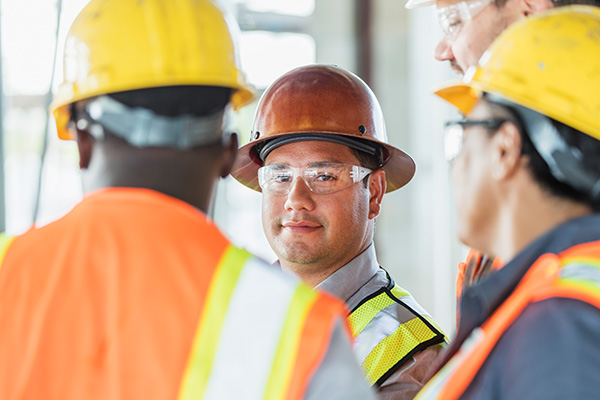How to Choose the Right Contractor for Your Seismic Retrofit Project
California is the second most seismically active state in the country, which is why you should consider getting a seismic retrofit for your home to protect it from potential earthquake damage. Seismic retrofits, also called earthquake retrofits, are particularly important for older homes that were built before 1980.
While getting an earthquake retrofit won’t guarantee that your house is completely protected from earthquake damage, it does make the structure more resilient and may protect you from significant financial losses.
But it’s important to recognize that not all earthquake retrofit contractors are created equal. Choosing the right contractor is crucial so you can be confident that the retrofit will help protect your house. In fact, hiring the right contractor can make all the difference in the safety and effectiveness of your retrofitting project. In this blog, we‘ll explain how to find the right contractor for your retrofit.
How to Find a Qualified Earthquake Retrofit Contractor
It’s important to do your research in order to find a qualified seismic retrofit contractor. Check out this Construction Project Check List (PDF) that you can use to help guide you through the process of finding a contractor. We’ll review the most important elements from that Check List here.
Start by asking for contractor recommendations from trusted friends, family, or neighbors who have recently completed their own seismic retrofits. If you don’t know anyone who’s had a recent retrofit, consider reaching out to your city or your county’s local building department to ask for contractor recommendations. You can also use the Earthquake Soft Story (ESS) Contractor Directory, where you can search for earthquake retrofit contractors by ZIP Code.
You can also try looking for contractors online, but be sure to search for them and read their reviews on trusted platforms like Google Business Profiles (Google Maps), Yelp, Houzz or other online review websites before asking for bids.
Things to Ask Before Hiring a Contractor
Before hiring a contractor for your seismic retrofit project, ask questions to make sure they’re capable and qualified to handle the work required to successfully retrofit your home. Take all the time you need to carry out this process. Choosing the right contractor will help ensure that your retrofit is completed safely and correctly so that your home is as protected as it can be when the ground starts to shake.
Here are some questions you should ask any potential contractor:
1. Are you licensed and certified by the California Contractors State License Board (CSLB)?
Per the California Contractors State License Board’s (CSLB) requirements for contractors, “anyone who contracts to perform work on a project that is valued at $500 or more for combined labor and materials cost must hold a current, valid license from CSLB.”
If a contractor doesn’t hold a license, don’t use them for an earthquake retrofit. You can ask to see their "pocket license,” which serves as proof that the contractor is currently licensed and that they have their license on hand.
You should also verify each contractor’s license by searching for their license number on the California Contractors State License Board website.
2. How much experience do you have in retrofitting homes like mine?
As we explained on our page covering structural risks from earthquakes, different types of houses require different types of retrofits. Ideally, you’ll want to use a contractor who has experience performing the specific type of retrofit your home needs. For details on the different types of constructions and the different types of retrofits, see the following pages of our website:
- Retrofits for Raised Foundation Houses
- Retrofits for Stem-Wall Houses
- Retrofits for Cripple-Wall Houses
- Retrofits for Post & Pier Houses
- Retrofits for Houses with a Living Space Over the Garage (AKA “Soft Story Retrofits”)
- Retrofits for Hillside Houses
- Retrofits for Mobilehomes & Manufactured Homes
3. Do you have appropriate insurance?
According to the California Business & Professions Code §7159.3 (SB 2029), California contractors must inform you if they carry Commercial General Liability Insurance. Per the CSLB website, they must also provide you with a completed copy of this form to verify that they’ve done that in writing. You should also ask each contractor if they carry Workers’ Compensation Insurance, which is a California requirement for all employers, including those in the construction industry.
Make sure to ask your potential contractor if they carry these insurances, which could protect you from liability in case of accidents or injuries.
4. Can you provide references from previous retrofit projects?
Ask your contractor to provide references from previous retrofit clients. This is an excellent way to verify that they’ve delivered quality work on prior retrofit projects. Make sure to contact the references provided and ask them about their experiences working with the contractor you’re considering.
This is one of the best ways to find out whether or not a contractor will deliver on their promises and should give you a good idea about how easy they are to work with.
5. Can you provide a detailed proposal with your retrofit quote?
Contractors should be able to provide you with a detailed retrofit proposal that covers the scope of the planned work, including timelines, materials, and total costs.
According to the Contractors State License Board’s Construction Project Check List (PDF), it’s a good idea to get at least three bids from different contractors so that you can compare costs and find out which contractor is best for your particular project.
Why It’s So Important to Follow These Guidelines
While it’s absolutely possible to get help paying for an earthquake retrofit, it’s still a big investment in your home. You’ll want to make sure that your retrofit gives your home the most protection possible from earthquake damage. This is particularly important for anyone who lives on or near an active fault and within any part of California that faces a high probability of experiencing a major earthquake.
Following the tips above will help you find an earthquake retrofit contractor who is properly licensed, experienced, and able to deliver your retrofit project on time, within budget, and according to your house’s unique and specific needs.
Remember, the primary goal of a seismic retrofit is to make sure that you, your loved ones, and your home are better protected against earthquake damage. Invest your time now in this important vetting process so you can have peace of mind and improve your physical and financial safety when the shaking starts.



